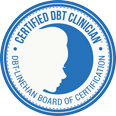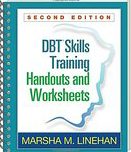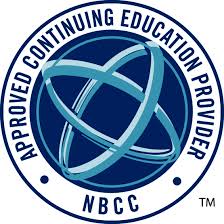Future Dates To Be Announced Soon!
Presented via Zoom Video Communications
PRESENTED BY
DBT-Linehan Board of Certification Certified Clinician™
COURSE DESCRIPTION
Dialectical Behavior Therapy (DBT) is a highly efficacious treatment developed by Marsha M. Linehan, PhD for multi-diagnostic, severely disordered individuals with pervasive emotion dysregulation. While originally developed for difficult-to-treat patients with borderline personality disorder, research has demonstrated that DBT is also effective for patients with a variety of complex problems, including eating disorders and substance abuse, where emotion dyscontrol are often at the core of the patient’s problems and/or interfere with long-term maintenance of therapeutic progress. DBT has been adapted for use in a variety of settings, including prisons, inpatient hospitals, schools, and juvenile justice facilities.
Topics covered will include:
- Theoretical basis for DBT and biosocial theory
- Big, emerging research trends and implications for DBT and DBT programs, including cost-effectiveness data
- Structural strategies in DBT, including Stages & Targets of treatment
- Strategies for adapting DBT to unique settings using DBT functions and modes
- Effective use of the behavioral chain analysis to zero in on what’s controlling problem behaviors
- Validation strategies: When and how to use them
- Dialectics: What it is and how it’s used in DBT
- Overview of DBT skill modules
CONTINUING EDUCATION AND LEARNING OBJECTIVES
Upon completion of this two-day workshop, participants will be able to:
- Describe the biosocial theory and its components.
- Describe the patients for whom DBT is effective and identify the most important components of DBT given recent scientific findings.
- List and describe the rationale for targets of treatment in Stage I DBT.
- Identify the components of a behavioral chain analysis.
- Describe six levels of validation and function of validation strategies.
- Describe the primary dialectic in DBT and how dialectics are applied in DBT.
- Name the DBT Skills modules and their primary function.
WHO SHOULD ATTEND?
This course is designed for mental health and other professionals (clergy, teachers, nurses, PCPs) who are called upon to help improve their clients lives through skillful actions.
REQUIREMENTS AND PREREQUISITES
There are no prerequisites for this course. For maximal impact, we encourage learners to bring copies of Linehan’s (2014) skills training manuals to the workshop – DBT Skills Training Handouts and Worksheets, Second Edition 2nd Edition
CONTINUING EDUCATION HOURS
 Participants who complete both training days will earn 12 CE hours.
Participants who complete both training days will earn 12 CE hours.
Portland DBT Institute has been approved by NBCC as an Approved Continuing Education Provider, ACEP No. 6326.
Programs that do not qualify for NBCC credit are clearly identified. Portland DBT Institute is solely is responsible for all aspects of the programs.
PRICING
| Individual Registration Fee $349.00 |
Group Registration Fee for 3 or more $325.00 / person |
Student Registration Fee $315.00 |
Private Training Requests
Portland DBT Institute training is available to schedule as a private training for your group. PDBTI’s training team travels locally, nationally, and internationally, to provide evidence based, adherent DBT training. Please fill out our Training Request Form and a training coordinator will contact you to see how we can work together to exceed your organization’s training goals.
CANCELLATIONS AND REFUNDS
A $60.00 handling fee will be deducted upon cancellation. Refund requests by fax or email must be received two weeks before the start date. In addition, the fees are non-transferrable.
PDBTI reserves the right to cancel any program due to under-enrollment, or any course due to work stoppages, instructor illness or inclement weather. If a course is cancelled, PDBTI is responsible for refunding only the course fee.
